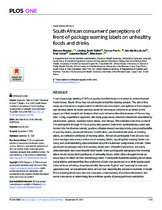South African consumers’ perceptions of front-of-package warning labels on unhealthy foods and drinks

View/
Date
2021Author
Bopape, Makoma
Taillie, Lindsey Smith
Swart, Rina
Metadata
Show full item recordAbstract
Front-of-package labeling (FOPL) is a policy tool that helps consumers to make informed
food choices. South Africa has not yet implemented this labeling system. The aim of this
study was therefore to explore adult South African consumers’ perceptions of front-of-package warning labels on foods and non-alcoholic beverages (referred to as drinks in this
paper) and their insights into features that could influence the effectiveness of the warning
label. Using a qualitative approach, the study purposively selected consumers diversified by
urbanization, gender, socioeconomic status, and literacy. We collected data from a total of
113 participants through 12 focus group discussions. Data were systematically coded and
divided into five themes namely, positive attitudes toward warning labels, perceived benefits
of warning labels, perceived behavior modification, perceived beneficiaries of warning
labels, and effective attributes of warning labels.
